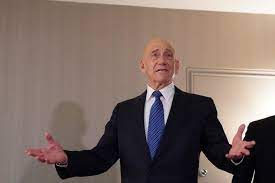TEL AVIV (AP): Israel’s former prime minister on Thursday urged world leaders to shun Israel’s current prime minister, Benjamin Netanyahu, as he presses ahead with a plan to overhaul the country’s justice system. The United States and Germany, two of Israel’s closest allies, called on Netanyahu to slow down.
The rare calls for restraint and international intervention came as thousands of Israelis once again took to the streets to protest Netanyahu’s plan.
Ehud Olmert, who served as prime minister from 2006-2009, said that global leaders should refuse to meet with Netanyahu. He appealed specifically to British Prime Minister Rishi Sunak, who is expected to host Netanyahu in the coming weeks.
“I urge the leaders of the friendly countries to the state of Israel to refrain from meeting with the Israeli prime minister,” Olmert said.
He added that he was aware his call, as a former Israeli prime minister, “is quite extraordinary” but that the situation calls for it. “I think that the present government of Israel is simply anti-Israeli,” Olmert said.
He took aim at Netanyahu’s far-right coalition, an alliance of ultra-Orthodox and ultranationalist parties that oppose Palestinian independence and support increased settlement construction in occupied territories claimed by the Palestinians.
Netanyahu’s coalition allies today have close ties with the West Bank settler movement and have a history of statements offensive to Palestinians, women, LGBTQ people and minorities.
Itamar Ben-Gvir, the current minister for national security was convicted in the past of incitement to racism and supporting a terror group. Netanyahu’s finance minister, Bezalel Smotrich, recently called for a Palestinian village in the occupied West Bank to be “erased,” though he later apologized after an international uproar over the comments.
“Those who are in favor of the state of Israel should be against the prime minister of the state of Israel,” Olmert said.
A spokesman for Netanyahu did not immediately respond to a request for comment.
Netanyahu and his allies are now barreling ahead with a plan that aims to weaken Israel’s Supreme Court and give his parliamentary coalition control over the appointment of judges.
Netanyahu says the plan will correct an imbalance that he says has given the courts too much sway in how Israel is governed. Critics say the overhaul will upend the country’s system of checks and balances and would give the prime minister too much power. They also say Netanyahu, who is on trial for corruption charges, could escape justice once the court system is revamped.
Israel’s figurehead president, Isaac Herzog, offered a compromise proposal to the nation late Wednesday. But Netanyahu quickly rejected the package as “one sided” and favoring his opponents.
The overhaul has plunged Israel into one of its worst domestic crises. Tens of thousands of people have taken to the streets over the past two and a half months, and the plan has sparked an uproar from top legal officials, business leaders who say it will damage the economy and from within the country’s military, the most trusted institution among Israel’s Jewish majority. Reservists have pledged not to serve under what they see as a shift toward autocracy.
Protesters held a “day of disruption” for a third week on Thursday, with thousands of people blocking roads, including the main highway of the seaside metropolis of Tel Aviv.
Protesters in Jerusalem drew a large red and pink streak on city streets leading to the Supreme Court and a small flotilla of bloats blocked the shipping lane off the coast of the northern city of Haifa.
Key Israeli allies also waded into the debate. At a joint news conference with Netanyahu in Berlin, German Chancellor Olaf Scholz voiced concern about the overhaul plan and praised the Israeli president’s attempts to seek a “broad basic consensus.”
“As close friends of Israel with shared democratic values, we are following this debate very closely, and I cannot hide the fact that we’re following it with great concern,” Scholz said at a news conference alongside Netanyahu. “The independence of the judiciary is a precious democratic asset.”







